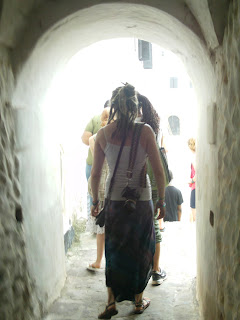Our schedule in Cape Coast was just as busy as it was in Accra. We arrived on a Sunday, and following lunch and a briefing from program staff, students entered their homestays with Cape Coast families. While students primarily stay in small hotels or hostels during the program, in Cape Coast the schedule was designed so as to allow students to live with local families. Indeed, the best way to learn about a culture is to live with a family, to observe cultural practices, examine similarities and differences, and to build new connections and friendships.
On Monday, we visited the Cape Coast Dungeon. Today a World Heritage Site, the Cape Coast Dungeon was once one of the major Forts through which enslaved Africans were held and then transported to the Americas and Europe (see forthcoming post on the Cape Coast Dungeons). Following the visit to Cape Coast Dungeon, we had the opportunity to engage in discussion with University of Cape Coast Vice-Chancellor Dr. Naana Opoku-Agyemang, who offered the lecture “Where there is no Silence: Articulations of Resistance to Enslavement.”
We took Tuesday as a chance to decompress a bit from the experience of visiting the Cape Coast Dungeon, by visiting Kakum National Park, about 30kms north of Cape Coast. One of Ghana’s best-known national parks, Kakum is a tropical rainforest with forest canopy walks high above the forest. With over 500 species of butterflies, several different types of birds, and unique fauna (many of which are of significant cultural and medicinal value to Ghanaians), Kakum was a great day excursion. With some putting aside a fear of heights, students and staff enjoying walking the forest canopy (check the photos below!). After Kakum, we drove to nearby Brenu Beach for some lunch and beach time. Some lounged in hammocks while others swam.
On Wednesday, we re-engaged the discussion of the Trans-Atlantic slave trade by visiting Elmina, another slave dungeon in the area. Following the tour we traveled to a nearby beach-side restaurant and lodge for some wonderful Ghanaian food as well as another discussion on the difficult history of slavery. This second discussion was facilitated by Rabbi Coheen Halevi, an African-American who has lived in Ghana for 25 years, is married to a Ghanaian, and is heavily involved with educational work on the slave dungeons for the purpose of bringing people together, examining the past, healing, and discussion. Rabbi is also instrumental in the important work of Panafest, which is a bi-annual festival held in Ghana since 1992 to promote unity and Pan-Africanism. Our discussion with Rabbi initially focused on the slave dungeons, and broadened out to talk about Ghana’s role in Africa, worldwide, and the development challenges that face the country on local, national, and global levels.










No comments:
Post a Comment